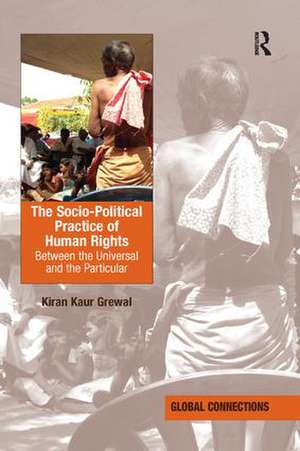The Socio-Political Practice of Human Rights: Between the Universal and the Particular: Global Connections
Autor Kiran Kaur Grewalen Limba Engleză Paperback – 14 aug 2018
Considering the diverse ways in which human rights are enacted and mobilised, The Socio-Political Practice of Human Rights engages with major sites of tension and debate, examining the question of whether human rights are universal or culturally relative; their relationship to forms of economic and political domination; the role of law as a mechanism for social change and the ways in which the language of human rights facilitates or closes sites of radical resistance. By situating these debates in specific contexts, this book concludes by proposing new ways of theorizing human rights.
Empirically grounded and offering an alternate framework for understanding the fluid and ambiguous operation of power within the theory and practice of human rights, this volume will appeal to scholars of sociology, law and politics with interests in gender, resistance, international law, human rights and socio-legal discourse.
| Toate formatele și edițiile | Preț | Express |
|---|---|---|
| Paperback (1) | 299.03 lei 6-8 săpt. | |
| Taylor & Francis – 14 aug 2018 | 299.03 lei 6-8 săpt. | |
| Hardback (1) | 820.32 lei 6-8 săpt. | |
| Taylor & Francis – 7 iul 2016 | 820.32 lei 6-8 săpt. |
Preț: 299.03 lei
Preț vechi: 341.32 lei
-12% Nou
Puncte Express: 449
Preț estimativ în valută:
57.22€ • 59.03$ • 47.75£
57.22€ • 59.03$ • 47.75£
Carte tipărită la comandă
Livrare economică 27 martie-10 aprilie
Preluare comenzi: 021 569.72.76
Specificații
ISBN-13: 9781138368088
ISBN-10: 1138368083
Pagini: 230
Dimensiuni: 156 x 234 x 26 mm
Greutate: 0.43 kg
Ediția:1
Editura: Taylor & Francis
Colecția Routledge
Seria Global Connections
Locul publicării:Oxford, United Kingdom
ISBN-10: 1138368083
Pagini: 230
Dimensiuni: 156 x 234 x 26 mm
Greutate: 0.43 kg
Ediția:1
Editura: Taylor & Francis
Colecția Routledge
Seria Global Connections
Locul publicării:Oxford, United Kingdom
Cuprins
List of Figures
Introduction
Part I The Debates
1. The universalism/cultural relativism debate
2. The place of law in human rights
3. The radical potential of human rights.
Part II The Case Studies
4. Kosovo - international humanitarianism and the narrative of ‘ancient ethnic hatreds’
5. International legal institutions - site of empowerment or further marginalisation? The example of the Special Court for Sierra Leone
6. From civil to political society - human rights, knowledge and power in post-war Sri Lanka
Part III Retheorising Human Rights
7. Between the universal and the particular? Reframing the rights versus culture debate
8. Law as tool for positive social change
Conclusion - reinvigorating the radical potential of human rights
Bibliography
Index
Introduction
Part I The Debates
1. The universalism/cultural relativism debate
2. The place of law in human rights
3. The radical potential of human rights.
Part II The Case Studies
4. Kosovo - international humanitarianism and the narrative of ‘ancient ethnic hatreds’
5. International legal institutions - site of empowerment or further marginalisation? The example of the Special Court for Sierra Leone
6. From civil to political society - human rights, knowledge and power in post-war Sri Lanka
Part III Retheorising Human Rights
7. Between the universal and the particular? Reframing the rights versus culture debate
8. Law as tool for positive social change
Conclusion - reinvigorating the radical potential of human rights
Bibliography
Index
Notă biografică
Kiran Kaur Grewal is Senior Research Fellow at the Institute of Social Justice at the Australian Catholic University, Australia.
Recenzii
‘A ground-breaking book. Kiran Kaur Grewal’s original study, based on ethnographic methods, enables her to show how individuals and groups make use of human rights to challenge practices in their everyday lives. The book is a far-reaching contribution to key debates in the study of human rights over universalism and cultural relativism, law and politics, empire and self-determination.’ Kate Nash, Goldsmiths, University of London, UK
Descriere
This book examines discourses of rights and practices of resistance in post-conflict societies, exploring the interaction between the international human rights framework and different actors seeking political and social change. Presenting detailed new case studies from Sierra Leone, Sri Lanka and Kosovo, it reveals the necessity of social scientific interventions in the field of human rights, shows how a shift away from the realm of normative political or legal theory towards a more sociological analysis promises a better understanding of both the limits of current human rights approaches and possible sites of potential.















